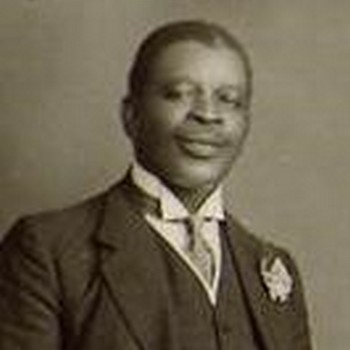DOCTOR OF PHILOSOPHY (HONORIS CAUSA) (posthumously)
 Mpilo Walter Benson Rubusana was born on 21 February 1858 at Mnandi, near Somerset East. After acquiring a primary school education at Peelton, Rubusana was admitted to Lovedale (a mission school) in 1876. Under the tutorship of Dr James Stewart, he studied for the Cape Teachers' Certificate, which he received with distinction in 1878. He studied theology for another two years at Lovedale. In 1880 he went to teach at the Peelton mission station while also working as an assistant pastor. In 1883 he married Deena Nzanzana, his first wife, who bore him five daughters and a son. He remained at Peelton until he was ordained in 1884 in the Congregational Church. He became a minister in the East Bank Location in East London, which was his residence until he died.
Mpilo Walter Benson Rubusana was born on 21 February 1858 at Mnandi, near Somerset East. After acquiring a primary school education at Peelton, Rubusana was admitted to Lovedale (a mission school) in 1876. Under the tutorship of Dr James Stewart, he studied for the Cape Teachers' Certificate, which he received with distinction in 1878. He studied theology for another two years at Lovedale. In 1880 he went to teach at the Peelton mission station while also working as an assistant pastor. In 1883 he married Deena Nzanzana, his first wife, who bore him five daughters and a son. He remained at Peelton until he was ordained in 1884 in the Congregational Church. He became a minister in the East Bank Location in East London, which was his residence until he died.
An important formative influence on Rubusana was his religious faith. He was a dedicated minister of the Congregational Church, participating in its councils and actively involved in spreading the Word. The Reverend Rubusana translated a number of Congregational texts into Xhosa, and was also active in the Native Education Association. As the descendant of a respected traditional statesman, Rubusana was in a position to persuade many of the chiefs in the Ciskei and Transkei to open up schools and churches in their districts.
As a recognised authority on the Xhosa language, he was appointed to serve on the Xhosa Bible Revision Committee, set up to refine the translation in the 1850’s. He personally supervised its publication in Britain when he accompanied the Thembu king, Dalindyebo, to the coronation of King Edward VII in 1904. During his stay in London he also published his first book, Zemk' Inkomo Magwalandini (Defend Your Heritage), an anthology of traditional epic poetry, didactic Christian essays and Church history. As one of the earliest collections of the oral poetic tradition, the book remains of inestimable historical and literary value. Zemk' Inkomo Magwalandini reflects the two dimensions of Rubusana's political thinking: Christian belief and education on the one hand, while on the other affirming traditional African values.
While serving as a pastor in East London, Rubusana helped found and edited Izwi Labantu, a Xhosa language newspaper based in East London, and acted as spokesperson for African pressure groups. In 1910 he became the only African ever elected to a seat on the Cape Provincial Council (representing the Thembu people). In 1911 he attended the Universal Races Congress in London where he met WEB Du Bois and other early Pan-Africanists. Rubusana was one of the founder members of the South African Native National Congress, later to become the ANC in 1912 and in 1914 went to Britain with a SANNC delegation to protest against the 1913 Native Land Act. In 1919 he served on a committee that drafted the SA Native National Congress constitution.
Rubusana died in East London in 1936. His life story spans the crucial years in the shaping of modern South Africa. For nearly forty of those years he was actively engaged in the political and social struggles of this country.
As a man of the cloth, a writer and political leader he was at the forefront of the battles waged by his people. He was a man of personal courage and integrity, committed to the democratic ideal of a free South Africa.
In the words of Nelson Mandela ”The life and work of Mpilo Walter Benson Rubusana are an important part of our democratic heritage from which we draw inspiration.”
In recognition of his substantial literary, religious and political contributions to South African society it is an honour for NMMU to confer the degree of Doctor of Philosophy (Honoris Causa) posthumously upon MPILO WALTER BENSON RUBUSANA.